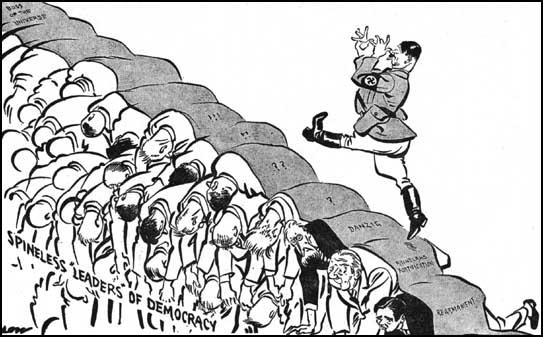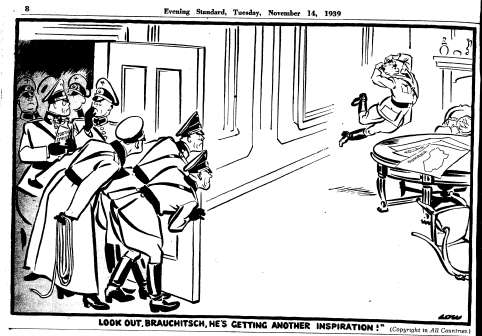I know the cartoons of David Low from before and during the Second World War, and I know that they are a high point in the cartoonists’ art. But I didn’t know today just how much he got under Hitler’s skin and how the British government tried to muzzle him.
I’ve learnt more from reading Tim Bouverie’s absorbing book Appeasing Hitler. In the late 30s Neville Chamberlain, the prime minister, and Lord Halifax, the Lord President, wanted to “create a positive atmosphere from which it would be possible to ‘discuss with Germany the practical questions involved in a European settlement’.” To that end Halifax went on a trip to Germany where he met Hitler and other senior Nazis.
At a dinner “Goebbels asked the Lord President to try to stop the attacks on Hitler in the British press, claiming that ‘nothing caused more bitter resentment in Germany’. In particular, he complained about cartoons lampooning Hitler and seemed to have singled out for special criticism…David Low.”
In retrospect Chamberlain and Halifax are dismissed as naïve appeasers, and Low, a New Zealander by birth, is a national hero. But it wasn’t so clear at the time, and Bouverie begins his book by listing the horrors of the First World War, explaining why any sane person would go to great lengths to avoid a repeat of such horrors.
Halifax tried leaning on Lord Beaverbook, who owned the Evening Standard, which published Low’s cartoons. But Beaverbrook explained that Low had a contract that gave him editorial freedom, and Low lampooned Beaverbrook in his cartoons. (Rupert Murdoch, I speculate, would never allow such freedom to a cartoonist, editor, or journalist.) Beaverbrook suggested that Halifax meet with Low himself.
As Bouverie observes, “This was a pretty unorthodox suggestion – rarely, if ever, can a senior British Cabinet Minister have had to personally censor a newspaper cartoonist – yet…Halifax was prepared to do [so] ‘in the interests of the good cause’. Meeting in Wardell’s Bayswater flat, Halifax asked Low to tone down his cartoons since they were having a detrimental effect on the Government’s quest to secure a lasting peace.” Low replied that he didn’t want to be responsible for a world war and, although he thought Hitler awful, would “slow down a bit.” He did slow down a little, substituting a composite dictator, Muzzler, for his strip cartoon about “Hit and Muss” (Hitler and Mussolini).
I wonder how much Muzzler referred to Halifax. Bouverie notes that “Although he claimed in his memoirs to have a great respect for that ‘chartered libertine’ the British press, he was, in reality, hardly less keen on stifling newspaper criticism of Germany than Dr Goebbels.”

